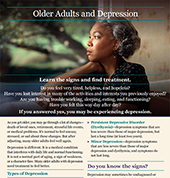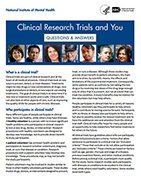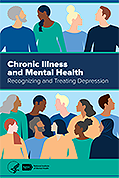Older Adults and Mental Health
Overview
It’s just as important for an older person with symptoms of depression to seek treatment as it is for someone younger. The impact of depression on health in older adults can be severe: much research has reported that depression is associated with worse health in people with conditions like heart disease, diabetes, and stroke. Depression can complicate the treatment of these conditions, including making it more difficult for someone to care for him- or herself and to seek treatment when needed. In older adults, depression may be disregarded as frailty, or it may be viewed as an inevitable result of life changes, chronic illness, and disability. Recognizing the signs and seeing a health practitioner is the first step to getting treatment, which can make a real difference in someone’s quality of life.




